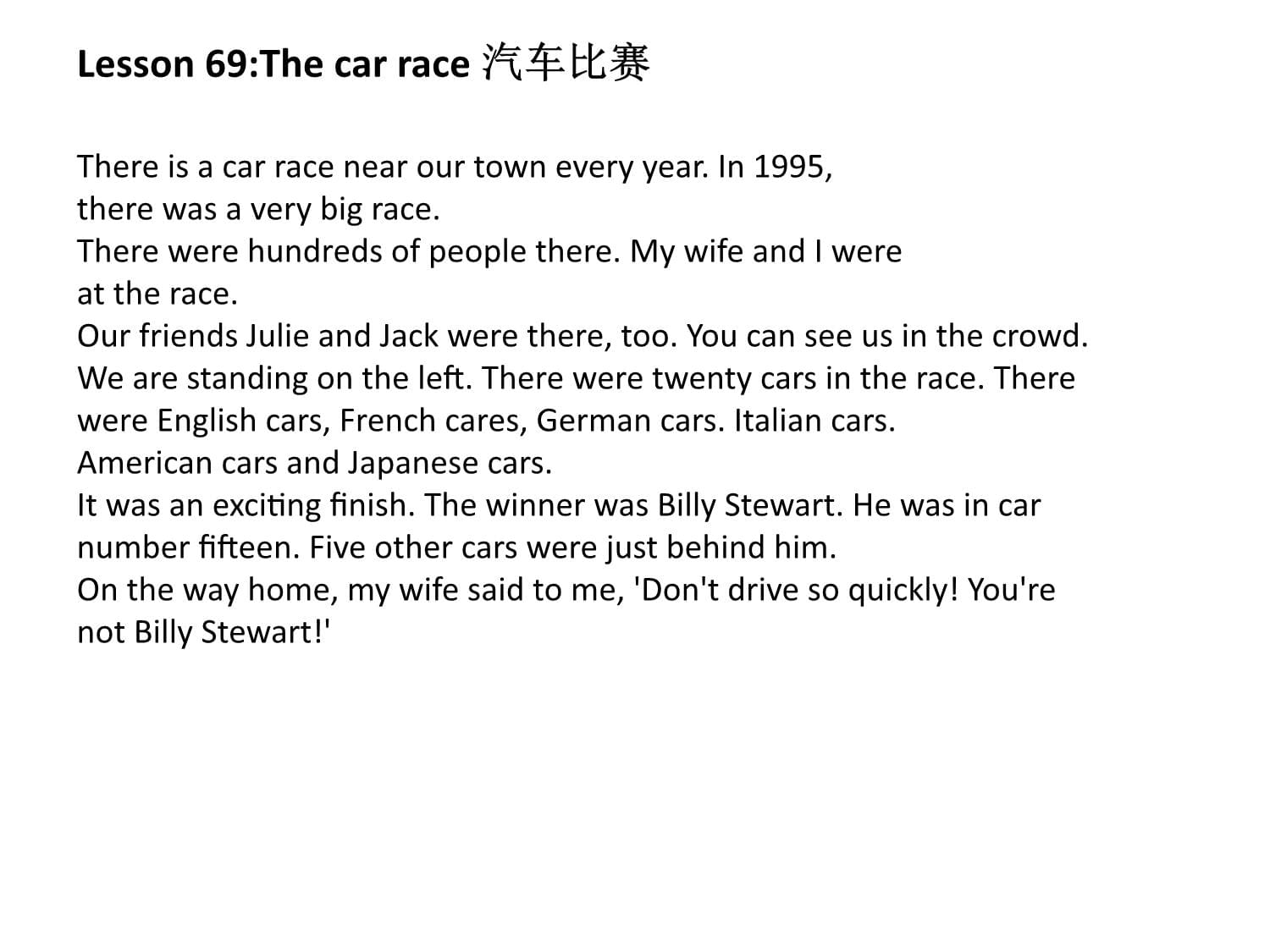




版權(quán)說明:本文檔由用戶提供并上傳,收益歸屬內(nèi)容提供方,若內(nèi)容存在侵權(quán),請進(jìn)行舉報(bào)或認(rèn)領(lǐng)
文檔簡介
新概念英語第一冊學(xué)習(xí)講義學(xué)習(xí)步驟:1,新單詞學(xué)習(xí)2,課文的講解以及閱讀3,現(xiàn)場演示4,問答環(huán)節(jié)5,關(guān)鍵知識點(diǎn)的講解Lesson
69:The
car
race
汽車比賽
Thereisacarracenearourtowneveryyear.In1995,therewasaverybigrace.Therewerehundredsofpeoplethere.MywifeandIwereattherace.OurfriendsJulieandJackwerethere,too.Youcanseeusinthecrowd.Wearestandingontheleft.Thereweretwentycarsintherace.TherewereEnglishcars,Frenchcares,Germancars.Italiancars.AmericancarsandJapanesecars.Itwasanexcitingfinish.ThewinnerwasBillyStewart.Hewasincarnumberfifteen.Fiveothercarswerejustbehindhim.Onthewayhome,mywifesaidtome,'Don'tdrivesoquickly!You'renotBillyStewart!'
Yearn.
年Racen.
比賽Townn.
城填Crowdn.
人群Standv.
站立Excitingadj.使人激動(dòng)的
justadv.正好,恰好
finishn.
結(jié)尾,結(jié)束
winnern.
獲勝者
behindprep.在……之后
wayn.
路途3QuestionstoAsk1,Whereisthereacarraceeveryyear?2,Whenwasthereaverybigcarrace?3,HowManypeoplewerethere?4,Wereourfriends,JulieandJack,attherace?5,Howmanycarswerethereintherace?6,Whatcarswerethereintherace?41,Askmeifthecarraceiseveryyear?When?2,Askmeiftherewasaverybigracein1995.When?3,AskmeifmywifeandIwereattherace?Where?4,Askmeifthereweretwentycarsintherace?HowMany?5,AskmeifthewinnerwasBillyStewart?Who?5Year的用法1、year(1)在不同時(shí)態(tài)的用法①現(xiàn)在時(shí)用everyyear(年年、每年)②進(jìn)行時(shí)用thisyear(今年)③過去進(jìn)用lastyear(去年)統(tǒng)稱為時(shí)間副詞短語。④將來時(shí)用nextyear(明年)⑤完成時(shí)用forayear(為期一年)(2)inayear在一年之內(nèi)例句:Todayisthecoolestinayear.(3)數(shù)詞+years+old多大年紀(jì)例句:Heis9yearsold.6Race的用法2、race可數(shù)名詞“比賽”(1)名詞單數(shù)+race…比賽(競賽)horserace/carrace/bicyclerace(2)be+intherace參加比賽(可用于人或物)(3)be+attherace觀看比賽(只用于人)例句:MywifeandIwereatthecarraceyesterday.例句:WereyouinthehorseracelastMonday.例句:Myfather’scarwasinthecarraceyesterday.(4)近義詞match比賽(球類賽)(n.火柴)例句:Iamwatchingthefootballmatch.(5)綜合比賽用game小型的運(yùn)動(dòng)會(huì)(學(xué)校等非正式的)sportsmeeting73、town(1)不可數(shù)名詞beintown在城里(2)可數(shù)名詞,指一個(gè)小鎮(zhèn)。例句:Mymotherlivesinasmalltown.(3)當(dāng)可數(shù)名詞用時(shí),對應(yīng)的是否village.當(dāng)不可數(shù)名詞用時(shí),對應(yīng)的是否country.inthecountry在鄉(xiāng)下84、crowd(1)集體名詞“人群”,單數(shù)名詞表示一堆(一類)人,動(dòng)詞用復(fù)數(shù)。例句:Thecrowdarenoisy.人群很吵鬧。Ourclassarehardworking.(2)量詞acrowdof+人一群人(只表示人)(3)inthecrowd在人群里例句:Icanseeyouinthecrowd.(4)當(dāng)動(dòng)詞用時(shí)指“擁擠”。Don’tcrowdme.(5)變adj為crowded,譯“擁擠的”。It‘scrowdedinthebus.(6)crowdinto擁護(hù),擠進(jìn)…crowdintothebus擠公共汽車95、stand(1)不及物動(dòng)詞,“站立”。例句:Canyoustandinfrontthedoor?(2)及物動(dòng)詞,后面加人,“容忍”。不用在進(jìn)行時(shí)。Mymomdon’tstandme.106、exciting(1)以ing為結(jié)尾的形容詞,只用來形容事。anexcitingrace/film/book(2)去ing,加ed:excited“感到”。以ed為結(jié)尾的形容詞,只用來形容人。beexcitedat“為…事而激動(dòng)”。Myfatherwasexcitedatthenews.beexcitedatan/theexcitingsth“為一件激動(dòng)人心的事而激動(dòng)”例句:
Wewereexcitedattheexcitingnews.Heisanexcitingperson.117、just=right+名詞短語(1)“正好”例句1:Myhouseisjust/rightnearthesea.例句2:Don’tsay,youmomisstandingjustbehindyou.別說話,你媽媽就站在你身后。(2)thevery(adj)+n.“正好的”very當(dāng)副詞時(shí),譯為“非常的”例句:Iamtheverypersonforthejob.我是做這件事最好的人選。128、finish(1)n.結(jié)尾,結(jié)束。thefinishof+n.①thefinishoftherace/book比賽的結(jié)尾/書的結(jié)尾②atthefinish在結(jié)束時(shí)③反義詞beginning開始n.thebeginningoftheclassatthebeginningof+n.(2)v.“完成”,后接名詞。finishone’ssth(homework/breakfast/soup)finishdoingsth
做完某事例句:I’mgoingtofinishmyhomeworkintheevening.(3)n.完美,完善;(舉止等)優(yōu)雅Hisdancinglacksfinish.他的舞跳得并不完美。139、winner(1)winv.“贏”;win+sth“贏…東西/事”winthecarracebeat+sb(賓格)“贏…某人”beathim贏他winthemoney贏錢1410、behind(1)指地點(diǎn),介詞。例如:behindthem(空間里面的后面—atthebackof)behind+sth/sb
在…后面(靜止?fàn)顟B(tài))after在…之后(運(yùn)動(dòng)v.后)runafter逃跑(2)落后,副詞。fallbehindin+學(xué)科“在某學(xué)科落后”例句:Don’tfallbehindinEnglish.別在英語上落后。(3)catchupwithsbin+學(xué)科“在某學(xué)科趕上某人”1511、way(1)路途,名詞。ontheway+副詞(home/here/there)“在…的路上”onthewayto+名詞(school/Beijing/thepark)“在去…的路上”(2)lostone’sway=lostoneself“迷路”Bytheway=BTW順便說一下Thisway,please!請這邊走。inthisway用這種方法16[課文注釋]1.hundredsof,數(shù)以百計(jì)的。這是用來表示不定數(shù)量的復(fù)數(shù)形式。類似的結(jié)構(gòu)還有thousandsof(數(shù)以千計(jì)的),millionsof(數(shù)以萬計(jì)的)。但必須注意:說fivehundred(五百,500),sixthousand(六千,6,000),twomillion(兩百萬,200萬)等時(shí),hundred,thousand,million這些詞因?yàn)橹坝芯唧w數(shù)字而本身不加-s。2、carnumberfifteen,第15號車。在表示編了號的東西時(shí),可以用基數(shù)詞表示順序:BusNo.332第332路公共汽車Question10第10個(gè)問題17Lesson70Whenweretheythere?1、stationer(1)atthestationer’s在文具店(2)stationery不可數(shù)名詞“文具”。Thereissomestationeryinthebox.2、Denmarkn.丹麥Danish丹麥人18一、短語:1、數(shù)百人hundredsofpeople2、千家萬戶millionsoffamilies3、1號車carnumberone4、今年thisyear5、明年nextyear6、每年everyyear7、一群學(xué)生acrowdofthestudents8、在回家的路上atthewayhome9、在人群中inthecrowd10、一輛擁擠的公共汽車acrowdedbus11、觀看比賽beattherace12、參加汽車比賽beinthecarrace13、比賽的結(jié)尾thefinishoftherace14、為…事而激動(dòng)beexcitedatsth15、在7月1日onJuly1st16、在文具店atthestationer’s17、一位芬蘭工程師aFinnishengineer19二、句子1、我有兩個(gè)朋友,一個(gè)是文具商,一個(gè)是理發(fā)師。Ihavetwofriends.Oneisastationer,Theotherisahairdresser.2、我爸爸是干這項(xiàng)工作最好的人選。Mtfatheristheverypeopleforthejob.3、奶奶家就在海邊。Mygrandmother’sisjustnearthesea.4、數(shù)千人參觀了賽車比賽。Thousandsofpeoplewereatthecarrace.5、去年這條路上有上座舊教堂。Therewasanoldchurchonthestreetlastyear.6、獲勝者座在5號車?yán)铩hewinnerwasincarnumberfive.7、去年花園里有許多花。Therewerealotofflowersinthegardenlastyear.8、不要在英語上落后。Don’tfallbehindinEnglish.9、昨天我們?yōu)榧?dòng)人心的汽車比賽而興奮。Wewereexcitedattheexcitingcarrace.10、其余三輛車就在我身后。Threeothercarswerejustbehindme.11、98年你在丹麥嗎?是的,我在。WereyouinDenmarkin1998.Yes,Iwas12、昨天,我市附近有一大群人。Therewasacrowdofpeoplenearourtownyesterday.13、比賽結(jié)果激動(dòng)人心。Thefinishoftheracewasexciting.14、昨天你去文具店了嗎?是的。Wereyouatthestationer’s?Yes,Iwas.20Lesson71He'sawful!
JANE:
What'sRonMarstonlike,Pauline?PAULINE:He'sawful!HetelephonedmefourtimesYesterday,andthreetimes
thedaybeforeyesterday.PAULINE:Hetelephonedtheofficeyesterdaymorningandyesterdayafternoon.Mybossansweredthetelephone.
JANE:
Whatdidyourbosssaytohim?PAULINE:Hesaid,"Paulineistypingletters.Shecan'tspeaktoyounow!"
PAULINE:ThenIarrivedhomeatsixo'clockyesterdayevening.Hetelephonedagain.ButIdidn'tanswerthephone!JANE:
Didhetelephoneagainlastnight?
PAULINE:Yes,hedid.Hetelephonedatnineo'clock.
JANE:
Whatdidyousaytohim?
PAULINE:Isaid,'ThisisPauline'smother.Pleasedon'ttelephonemydaughteragain!'
JANE:
Didhetelephoneagain?
PAULINE:No,hedidn't!21
↑
EXIT↑
EXITNewWordandexpressions生詞和短語
awfuladj.讓人討厭的,壞的
telephonev.&n.打電話;電話
timen.
次(數(shù))
answer
v.
接(電話)
last
adj.最后的,前一次的
phone
n.
電話(=telephone)
again
adv.又一次地
say(said/sed/)
v.
說
22QuestionstoAsk1,IsRonMarstonNice?2,Whatishelike?3,WhatdidRonMarstondoyesterday?4,Howmanytimesdidhetelephonethedaybeforeyesterday?5,WhendidRonMarstontelephonetheoffice?6,Whoansweredthephone?7,WhattimedidPaulinearrivehomeyesterdayevening?8,Didsheanswerthephone?9,WhattimedidRonMarstontelephonelastnight?10,Didhetelephoneyouagain?231,AskmeifRontelephonedfourtimesyesterday?Howmanytimes?2,Askmeifthebossansweredthephone?Who?3,AskmeifIarrivedhomeatsix?When?4,AskmeifIansweredthephone?Whydidn’t?5.Askmeifhetelephonedagain?Whydidin’t?24awfully:(adv.)=veryIamawfully(very)sorry.Heisawful(terrible).25★timen.次(數(shù))
time在英語中作不可數(shù)名詞時(shí)表示“時(shí)間”;作可數(shù)名詞時(shí)表示“次數(shù)”,三次或三次以上通常用基數(shù)
詞+times表示:
once,twice,threetimes
ontime按時(shí),準(zhǔn)時(shí)
intime及時(shí)
allthetime一直
I’vebeenwaitinghereallthetime.
onceuponatime很久很久以前
cheatthetime打發(fā)時(shí)間
Wearecheatingthetimebyplayingcards.
watchone’stime等待時(shí)機(jī)
I’mwatchingmytime.
ofthetime當(dāng)時(shí)
maketime騰出時(shí)間
Timewilltell.時(shí)間會(huì)證明一切。
Timeandtidewaitfornoman.歲月不等人。
Timehealsallwounds.時(shí)間會(huì)治愈所有的創(chuàng)傷。26Answer的用法①v.對..作出反應(yīng);響應(yīng)
answerthephone/telephone接電話
answerthedoor/doorbell應(yīng)聲開門
Marytookafewminutestoanswerthedoor.
瑪麗拖了幾分鐘時(shí)間才去開門。
②v.回答;答復(fù)
answeraletter回信
Idon’tthinkyou’veansweredmyquestion.
我認(rèn)為你沒有回答我的問題。
③n.答案;解決辦法;答復(fù)
Iwrotehimseverallettersbutcouldn’tgetananswer.
我給他寫了好幾封信,可都沒有回音。
DoyouknowtheanswertoQuestion10?
Thisisoneofthepossibleanswerstotoday’senvironmentalproblems.
這是有可能解決當(dāng)今環(huán)境問題的辦法之一。
27time:(可數(shù))次數(shù);(不可數(shù))時(shí)間once(twice,three)oncemore,onceagainTimeflies!Timehealsallwounds.Timeandtidewaitfornoman.answer:(v.)接電話;(n.)答案saytooneself:自言自語What'stheclimatelikeinyourcountry?What'stheweatherlikeinspring?What'syourfatherlike?What'sRonMarstonlike?What'syoursonlike?28用介詞at,on和in的時(shí)間短語
(1)用介詞
at的時(shí)間短語通常可表示:確切的時(shí)間(如at10o'clock10點(diǎn)鐘時(shí)),用餐時(shí)間(如atlunchtime午餐時(shí)),其他時(shí)刻(如atnoon中午時(shí)),節(jié)日(如atChristmas圣誕節(jié)時(shí)),年齡(如attheageof2727歲時(shí))等。
介詞at可表示地點(diǎn),通常用于某個(gè)小地點(diǎn)之前:
atthebus-stop在公共汽車站
attherailwaystation在火車站
atthebutcher's在肉店
atschool在學(xué)校
attheoffice在辦公室
athome在家
29(2)介詞on用于周和月份中的任何一天之前。請參見Lessons65~66語法部分。
(3)用介詞in的時(shí)間短語通常可表示:
一天中的某段時(shí)間(如intheevening在晚上),月份(如inMarch在3月),年份(如in1997在1997年),季節(jié)(如inspring在春天),
世紀(jì)(如inthe20thcentury在20世紀(jì)),節(jié)日(如inEasterweek在復(fù)
溫馨提示
- 1. 本站所有資源如無特殊說明,都需要本地電腦安裝OFFICE2007和PDF閱讀器。圖紙軟件為CAD,CAXA,PROE,UG,SolidWorks等.壓縮文件請下載最新的WinRAR軟件解壓。
- 2. 本站的文檔不包含任何第三方提供的附件圖紙等,如果需要附件,請聯(lián)系上傳者。文件的所有權(quán)益歸上傳用戶所有。
- 3. 本站RAR壓縮包中若帶圖紙,網(wǎng)頁內(nèi)容里面會(huì)有圖紙預(yù)覽,若沒有圖紙預(yù)覽就沒有圖紙。
- 4. 未經(jīng)權(quán)益所有人同意不得將文件中的內(nèi)容挪作商業(yè)或盈利用途。
- 5. 人人文庫網(wǎng)僅提供信息存儲空間,僅對用戶上傳內(nèi)容的表現(xiàn)方式做保護(hù)處理,對用戶上傳分享的文檔內(nèi)容本身不做任何修改或編輯,并不能對任何下載內(nèi)容負(fù)責(zé)。
- 6. 下載文件中如有侵權(quán)或不適當(dāng)內(nèi)容,請與我們聯(lián)系,我們立即糾正。
- 7. 本站不保證下載資源的準(zhǔn)確性、安全性和完整性, 同時(shí)也不承擔(dān)用戶因使用這些下載資源對自己和他人造成任何形式的傷害或損失。
最新文檔
- 安全教育試題及答案B
- 樂山市中考測試題及答案
- 多維大數(shù)據(jù)分析與可視化研究-洞察闡釋
- 工貿(mào)企業(yè)綜合應(yīng)急處置預(yù)案
- 2025合同范本借款合同模板
- 廠房租賃保證金合同規(guī)范
- 高端餐廳裝修設(shè)計(jì)施工及后期維護(hù)合同
- 車輛贈(zèng)與及新能源汽車推廣應(yīng)用合同
- 餐飲企業(yè)股權(quán)激勵(lì)計(jì)劃股東協(xié)議合同
- 卡通里的新年愿望
- 醫(yī)美機(jī)構(gòu)醫(yī)廢管理制度
- 深圳2025年深圳市住房公積金管理中心員額人員招聘8人筆試歷年參考題庫附帶答案詳解
- 委托投資協(xié)議范本
- 供配電技術(shù) 課件 項(xiàng)目7、8 供配電系統(tǒng)的保護(hù)、電氣設(shè)備的防雷和接地
- 安徽省合肥市2025屆高三下學(xué)期5月教學(xué)質(zhì)量檢測(三模)英語試卷(含音頻)
- 貴州國企招聘2025貴州烏江煤層氣勘探開發(fā)有限公司招聘16人筆試參考題庫附帶答案詳解
- 放射科出科試題 及答案
- 炊事員培訓(xùn)試題及答案
- 辦公大樓保安試題及答案
- 全國100所名校2025屆高考沖刺模擬英語試題含答案
- 職業(yè)技能等級認(rèn)定考試保密協(xié)議書

評論
0/150
提交評論